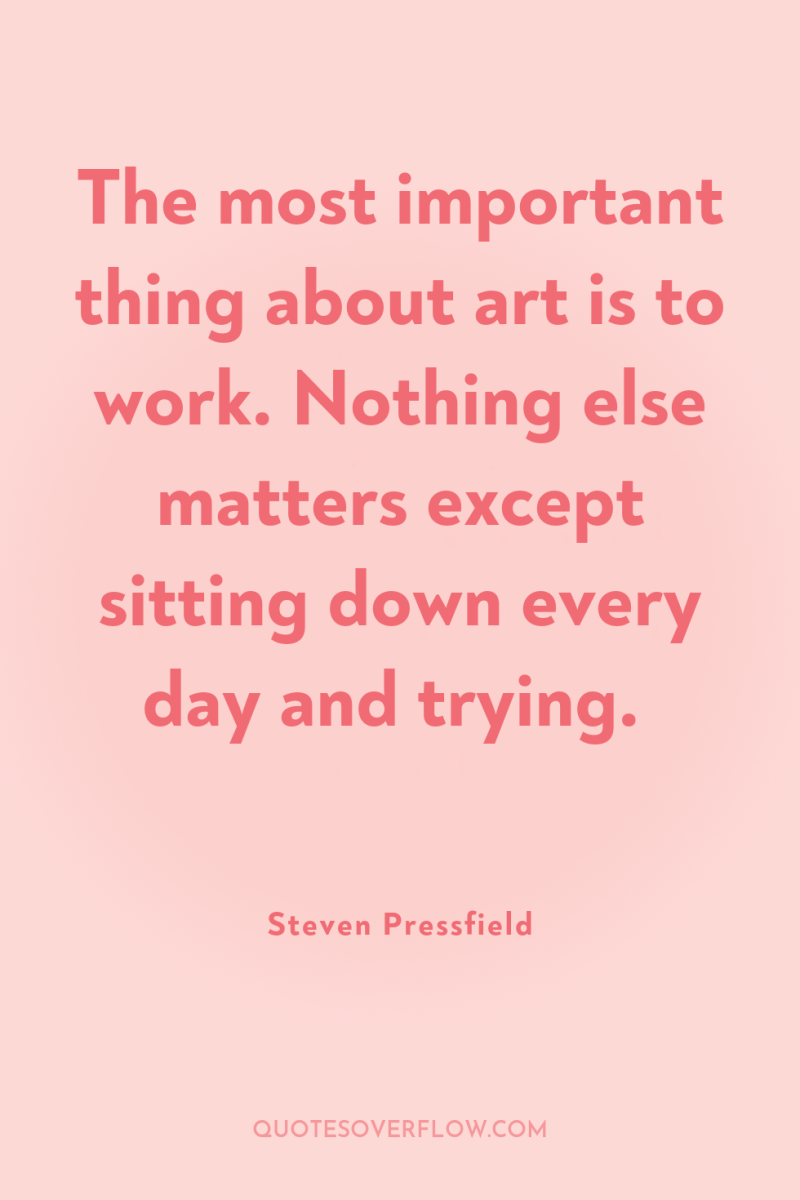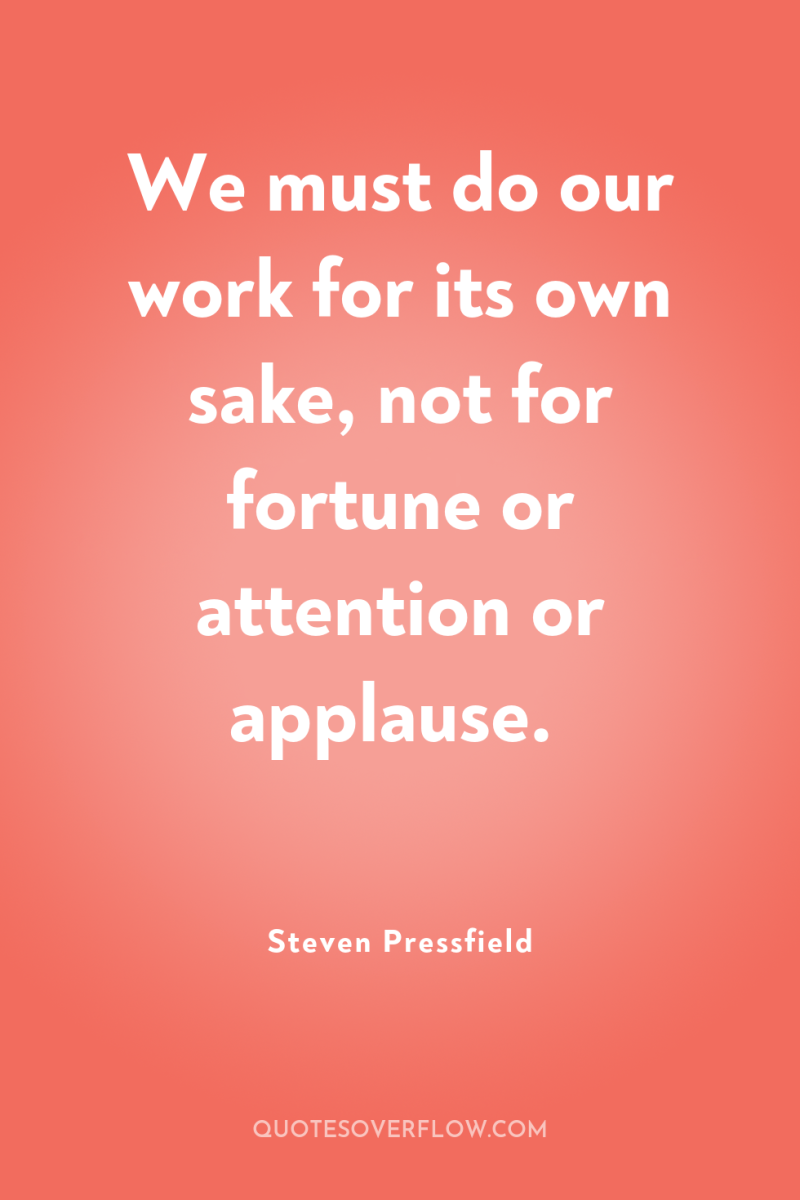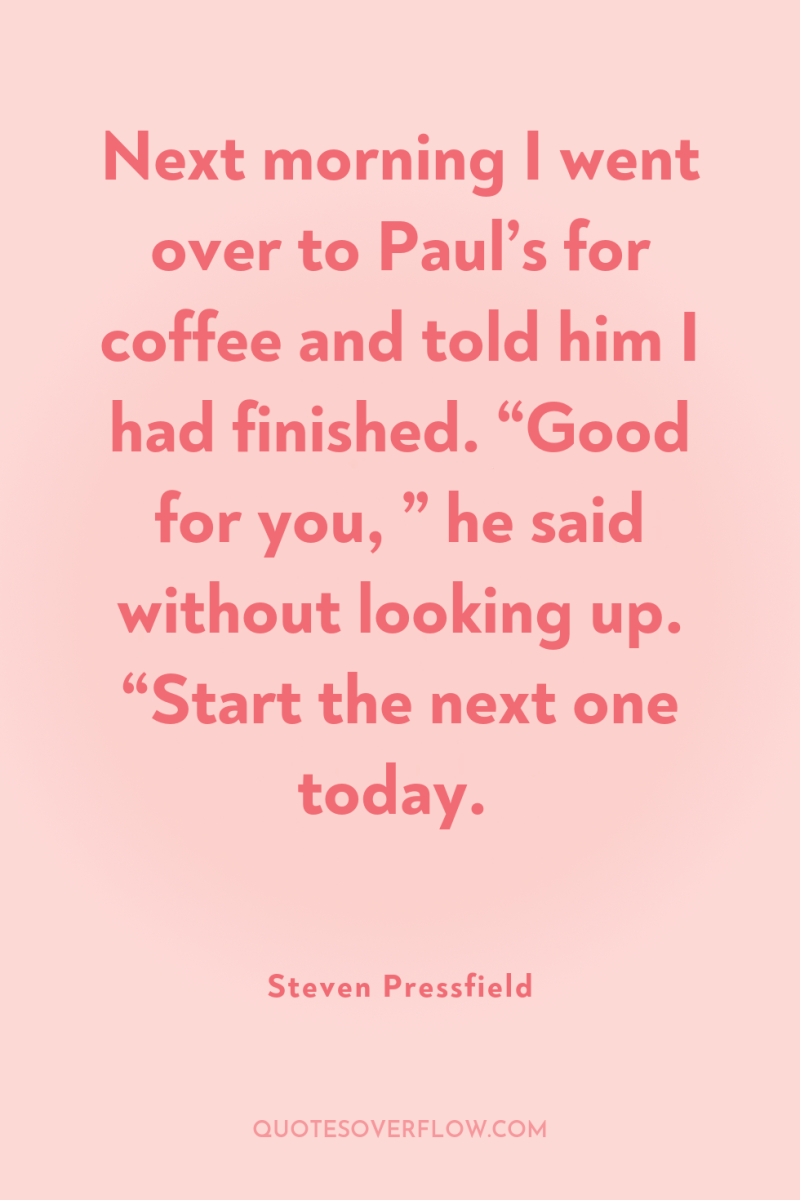
1
The most important thing about art is to work. Nothing else matters except sitting down every day and trying.Steven Pressfield

2
We must do our work for its own sake, not for fortune or attention or applause.Steven Pressfield

3
Next morning I went over to Paul’s for coffee and told him I had finished. “Good for you, ” he said without looking up. “Start the next one today.Steven Pressfield
4
This is the other secret that real artists know and wannabe writers don’t. When we sit down each day and do our work, power concentrates around us. The Muse takes note of our dedication. She approves. We have earned favor in her sight. When we sit down and work, we become like a magnetized rod that attracts iron filings. Ideas come. Insights accrete.Steven Pressfield
5
Muse, We are servants of the Mystery. We were put here on earth to act as agents of the Infinite, to bring into existence that which is not yet, but which will be, through us. Every breath we take, every heartbeat, every evolution of every cell comes from God and is sustained by God every second, just as every creation, invention, every bar of music or line of verse, every thought, vision, fantasy, every dumb-ass flop and stroke of genius comes from that infinite intelligence that created us and the universe in all its dimensions, out of the Void, the field of infinite potential, primal chaos, the Muse. To acknowledge that reality, to efface all ego, to let the work come through us and give it back freely to its source, that, in my opinion, is as true to reality as it gets. .Steven Pressfield
6
We are servants of the Mystery. We were put here on earth to act as agents of the Infinite, to bring into existence that which is not yet, but which will be, through us. Every breath we take, every heartbeat, every evolution of every cell comes from God and is sustained by God every second, just as every creation, invention, every bar of music or line of verse, every thought, vision, fantasy, every dumb-ass flop and stroke of genius comes from that infinite intelligence that created us and the universe in all its dimensions, out of the Void, the field of infinite potential, primal chaos, the Muse. To acknowledge that reality, to efface all ego, to let the work come through us and give it back freely to its source, that, in my opinion, is as true to reality as it gets. .Steven Pressfield
7
We experience [procrastination] as fear. But fear of what? Fear of the consequences of following our heart. Fear of bankruptcy, fear of poverty, fear of insolvency. Fear of groveling when we try to make it on our own, and of groveling when we give up and come crawling back to where we started. Fear of being selfish, of being rotten wives or disloyal husbands; fear of failing to support our families, of sacrificing their dreams for ours. Fear of betraying our race, our 'hood, our homies. Fear of failure. Fear of being ridiculous. Fear of throwing away the education, the training, the preparation that those we love have sacrificed so much for, that we ourselves have worked our butts off for. Fear of launching into the void, of hurtling too far out there; fear of passing some point of no return, beyond which we cannot recant, cannot reverse, cannot rescind, but must live with this cocked-up choice for the rest of our lives. Fear of madness. Fear of insanity. Fear of death. These are serious fears. But they're not the real fear. Not the master fear, the mother of all fears that's so close to us that even when we verbalize it we don't believe it. Fear That We Will Succeed.Steven Pressfield
8
We fear discovering that we are more than we think we are. More than our parents/children/teachers think we are. We fear that we actually possess the talent that our still, small voice tells us. That we actually have the guts, the perseverance, the capacity. We fear that we truly can steer our ship, plant our flag, reach our Promised Land. We fear this because, if it’s true, then we become estranged from all we know. We pass through a membrane. We become monsters and monstrous.Steven Pressfield
9
The professional has learned that success, like happiness, comes as a by-product of work. The professional concentrates on the work and allows rewards to come or not come, whatever they like.Steven Pressfield
10
The artist committing himself to his calling has volunteered for hell, whether he knows it or not. He will be dining for the duration on a diet of isolation, rejection, self-doubt, despair, ridicule, contempt, and humiliation.Steven Pressfield
11
O Divine Poesy, goddess, daughter of Zeus, sustain for me this song of the various-minded man who, after he had plundered the innermost citadel of hallowed Troy, was made to stay grievously about the coasts of men, the sport of their customs, good and bad, while his heart, through all the sea-faring, ached with an agony to redeem himself and bring his company safe home. Vain hope — for them. The fools! Their own witlessness cast them aside. To destroy for meat the oxen of the most exalted Sun, wherefore the Sun-god blotted out the day of their return. Make this tale live for us in all its many bearings, O Muse.” — from Homer’s Odyssey, translation by T.E. Lawrence (Lawrence of Arabia) .Steven Pressfield
12
We’re all pros already. 1) We show up every day 2) We show up no matter what 3) We stay on the job all day 4) We are committed over the long haul 5) The stakes for us are high and real 6) We accept remuneration for our labor 7) We do not overidentify with our jobs 8 ) We master the technique of our jobs 9) We have a sense of humor about our jobs 10) We receive praise or blame in the real worldSteven Pressfield
13
There's a problem with the hierarchical orientation, though. When the numbers get too big, the thing breaks down. A pecking order can hold only so many chickens.Steven Pressfield
14
When we drug ourselves to blot out our soul's call, we are being good Americans and exemplary consumers.Steven Pressfield
15
The working artist will not tolerate trouble in her life because she knows trouble prevents her from doing her work. The working artist banishes from her world all sources of trouble. She harnesses the urge for trouble and transforms it in her work.Steven Pressfield
16
Rule of thumb: The more important a call or action is to our soul's evolution, the Resistance we will feel toward pursuing it.Steven Pressfield
17
The professional learns to recognize envy-driven criticism and to take it for what it is: the supreme compliment. The critic hates most that which he would have done himself if he had had the guts.Steven Pressfield
18
In other words, any act that rejects immediate gratification in favor of long-term grown, health, or integrity. Or, expressed another way, any act that derives from our high nature instead of our lower. Any of these will elicit Resistance.Steven Pressfield
19
Lat at nigh have you experienced a vision of the person you might become, the work you could accomplish, the realized being you were mean to be? Are you a writer who doesn't write, a painter who doesn't pain, an entrepreneur who never starts a venture? Then you know what Resistance is.Steven Pressfield
20
To yield to Resistance deforms our spirit. It stunts us and makes us less than we are and were born to be.Steven Pressfield
21
Like a magnetized needle floating on a surface of oil, Resistance will unfailingly point to true North - meaning that calling or action it most wants to stop us from doing. We can use this. We can use it as a compass. We can navigate by Resistance, letting it guide us to that calling or action that we must follow before all others.Steven Pressfield
22
Nothing is as empowering as real-world validation, even if it's for failure.Steven Pressfield
23
The sign of the amateur is overglorification of and preoccupation with the mystery. The professional shuts up. She doesn't talk about it. She does her work.Steven Pressfield
24
The part that needs healing is our personal life. Personal life has nothing to do with work. Besides, what better way of healing than to find our center of self-sovereignty? Isn't that the whole point of healing?Steven Pressfield
25
It can pay off, being a hack. Given the depraved state of American culture, a slick dude can make millions being a hack. But even if you succeed, you lose, because you've sold out your Muse, and your Muse is you, the best part of yourself, where your finest and only true work comes from.Steven Pressfield
26
The hack is like a politician who consults the polls before he takes a position. He's a demagogue. He panders.Steven Pressfield
27
Resistance is always lying and always full of shit.Steven Pressfield
28
. None of us are born as passive generic blobs waiting for the world to stamp its imprint on us. Instead we show up possessing already a highly refined and individuated soul. Another way of thinking of it is: We're not born with unlimited choices. We can't be anything we want to be. We come into this world with a specific, personal destiny. We have a job to do, a calling to enact, a self to become. We are who we are from the cradle, and we're stuck with it. Our job in this lifetime is not to shape ourselves into some ideal we imagine we ought to be, but to find out who we already are and become it. .Steven Pressfield
29
The marine corps teaches you how to be miserable. This is invaluable for an artist. Marines love to be miserable. Marines derive a perverse satisfaction in having colder chow, crappier equipment, and higher casualty rates than any outfit of dogfaces, swabjockies, or flyboys, all of whom they despise. Why? Because those candyasses don't know how to be miserable. The artist committing himself to his calling has to be miserable. The artist committing himself to his calling has volunteered for hell, whether he knows it or not, he will be dining for the duration on a diet of isolation, rejection, self-doubt, despair, ridicule, contempt, and humiliation. The artist must be like that marine: he has to know how to be miserable. He has to love being miserable. He has to take pride in being more miserable than any soldier, or swabbie, or desk jockey, because this is war, baby, and war is hell. .Steven Pressfield
30
...she (the artist, the writer) doesn't wait for inspiration, she acts in the anticipation of its apparition.Steven Pressfield
31
The artist must be like that Marine. He has to know how to be miserable. He has to love being miserable.Steven Pressfield
32
In my younger days dodging the draft, I somehow wound up in the Marine Corps. There's a myth that Marine training turns baby-faced recruits into bloodthirsty killers. Trust me, the Marine Corps is not that efficient. What it does teach, however, is a lot more useful. The Marine Corps teaches you how to be miserable. This is invaluable for an artist. Marines love to be miserable. Marines derive a perverse satisfaction in having colder chow, crappier equipment, and higher casualty rates than any outfit of dogfaces, swab jockeys, or flyboys, all of whom they despise. Why? Because these candy-asses don't know how to be miserable. The artist committing himself to his calling has volunteered for hell, whether he knows it or not. He will be dining for the duration on a diet of isolation, rejection, self-doubt, despair, ridicule, contempt, and humiliation. The artist must be like that Marine. He has to know how to be miserable. He has to love being miserable. He has to take pride in being more miserable than any soldier or swabbie or jet jockey. Because this is war, baby. And war is hell." Page 68 .Steven Pressfield
33
The professional arms himself with patience, not only to give the stars time to align in his career, but to keep himself from flaming out in each individual work. He knows that any job, whether it’s a novel or a kitchen remodel, takes twice as long as he thinks and costs twice as much. He accepts that. He recognizes it as reality. The professional steels himself at the start of a project, reminding himself it is the Iditarod, not the sixty-yard dash. He conserves his energy. He prepares his mind for the long haul. He sustains himself with the knowledge that if he can just keep those huskies mushing, sooner or later the sled will pull in to Nome.Steven Pressfield
34
The working artist will not tolerate trouble in her life because she knows trouble prevents her from doing her work.Steven Pressfield
35
The awakening an artist must be ruthless, not only with herself but with others.Steven Pressfield
36
The artist committing himself to his calling has volunteered for hell.Steven Pressfield
37
The artist and the mother are vehicles, not originators. They don't create the new life, they only bear it. This is why birth is such a humbling experience. The new mom weeps in awe at the little miracle in her arms. She knows it came out of her but not from her, through her but not of her.Steven Pressfield
38
It's not the writing part that's hard. What's hard is sitting down to write. What keeps us from sitting down is Resistance.Steven Pressfield
39
Fear is good. Like self-doubt, fear is an indicator. Fear tells us what we have to do. Remember our rule of thumb: The more scared we are of a work or calling, the more sure we can be that we have to do it. Resistance is experienced as fear; the degree of fear equates to the strength of Resistance. Therefore the more fear we feel about a specific enterprise, the more certain we can be that that enterprise is important to us and to the growth of our soul. That's why we feel so much Resistance. If it meant nothing to us, there'd be no Resistance.Steven Pressfield
40
It's not the writing part that's hard. What's hard is sitting down to write.Steven Pressfield